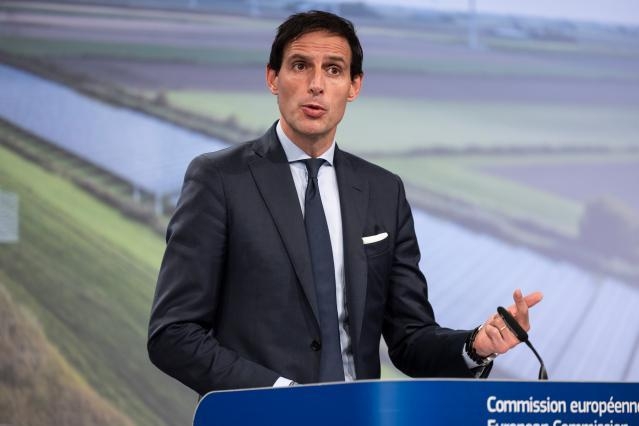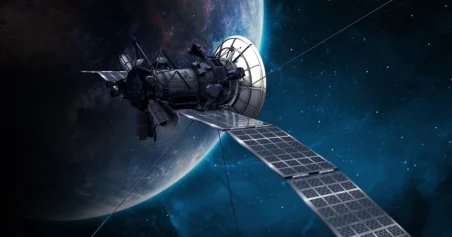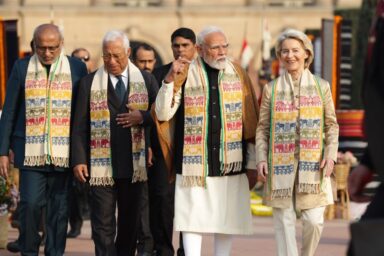The European Union has postponed finalising its 2040 emissions-reduction target, signalling a recalibration of the bloc’s environmental ambitions as economic headwinds intensify. Environment ministers in the Council did not vote on the hotly disputed target.
At a Brussels press conference on Thursday, 18 September, Danish Climate Minister Lars Aagaard and EU Climate Commissioner Wapke Hoekstra defended the bloc’s progress but acknowledged unresolved tensions between climate goals and industrial competitiveness.
“We haven’t crossed the finish line today, but we have made significant progress in reassuring that climate protection goes hand in hand with competitiveness,” said Mr Aagaard, whose country holds the EU presidency. The delay comes despite a provisional agreement among member states on a non-binding “statement of intent” to cut net emissions by 66.3 per cent to 72.5 per cent by 2040—a range critics argue falls short of the EU’s earlier 90 per cent aspiration.
The holstered climate law—which would legally bind the 2040 target—now awaits guidance from an October European Council summit. Mr Agaard stressed that leaders must weigh impacts on “industrial policy, security [and] the agricultural sector”. The process, he said, demands patience: “We can see the finishing line. All 27 [member states] are on board. I’m optimistic.”
You might be interested
Objections to ETS2 are being taken seriously
Mainly due to concerns from industrialised countries in Central and Eastern Europe, including Czechia and Poland, the Council did not vote on the target. Instead, only a so-called strategic discussion was held. Wopke Hoekstra, Commissioner for Climate, Net Zero and Clean Growth, emphasized that there is no change in placing climate action on the top of Commission’s agenda.
I am sure we will reach the goal (…) That is just to say that we will discuss technical details later. – Wopke Hoekstra, Commissioner for Climate, Net Zero and Clean Growth
The Council also discussed the ETS2 emissions trading system. It is to be introduced in 2027 and will impose charges on the combustion of fossil fuels, particularly in the transport and heating sectors. According to Commissioner Hoekstra, the Commission is carefully and thoroughly analysing the proposals and recommendations of the nineteen member states contained in the letter which was sent to the European Commission at the beginning of July 2025. The main concernes mentioned in the letter included social impacts of a possible sharp rise in the price of fuel, coal, or gas due to ETS2.
A discernible pivot
“I am sure we will reach the goal (…) That is just to say that we will discuss technical details later,” said Mr Hoekstra during the press conference. His official line notwithstanding, the bloc’s stance marks a discernible pivot. Once a vocal advocate for stringent climate rules, the EU now frames flexibility as pragmatic. “This is a three-step rocket,” said Mr Hoekstra, referencing the phased approval process. He praised the interim emissions range as “truly ambitious by any international standard”, though it trails Britain’s 77% target and skirts firm commitments.
Questions loom over how the EU will present its unfinished agenda at the upcoming UN General Assembly. “Other countries will question the EU’s commitment,” one journalist noted. Mr Agaard dismissed concerns: “Europe will live up to its Paris commitments. There is trust in our work.” Mr Hoekstra added that the statement’s range—peaking at 72.5 per cent—“matches the bar the UN is setting”.
All parties to the Paris Agreement must lift their burden. — Lras Aagaard, Danish Climate Minister
The delay underscores deepening rifts. While some member states push for higher targets, others demand “enabling conditions” to protect industries. Mr Hoekstra admitted talks involved “give and take”, with carbon capture and forestry flexibilities among contested levers. “Different member states have different perspectives,” he said. “Our job is to build a broad majority.”
A mere bargaining chip
The Commission’s original 2040 blueprint has softened into a bargaining chip. Mr Hoekstra denied backtracking but conceded flexibility: “I’m not religious about numbers. What matters is ambition.” The range’s lower end aligns with a linear trajectory to net-zero by 2050; the upper edge requires faster action.
With the EU accounting for just six per cent of global emissions, Mr Aagaard stressed shared responsibility: “All parties to the Paris Agreement must lift their burden.” Yet the bloc’s wavering risks undermining its diplomatic clout. The delayed NDC—a formal emissions plan under the Paris accord—now hinges on post-summit talks. “We will meet the deadline before COP30,” Mr Aagaard pledged.
For Mr Hoekstra, the path forward hinges on unity: “Democracy takes time. We solidify majorities, find common ground.” But time is a luxury the climate crisis seldom allows. As the EU navigates competing priorities, its claim to leadership grows hazier—one compromise at a time.











